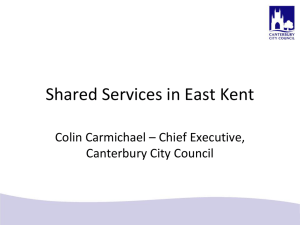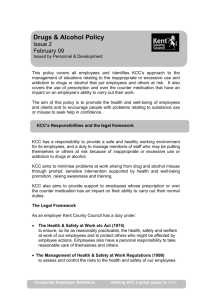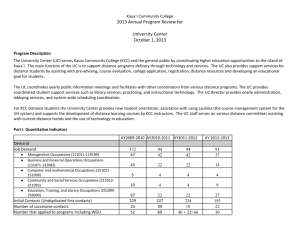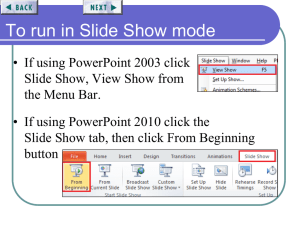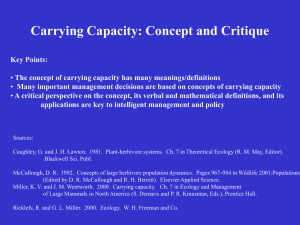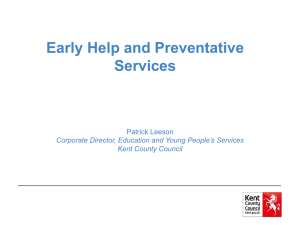Compliance Program and Code of Conduct
advertisement
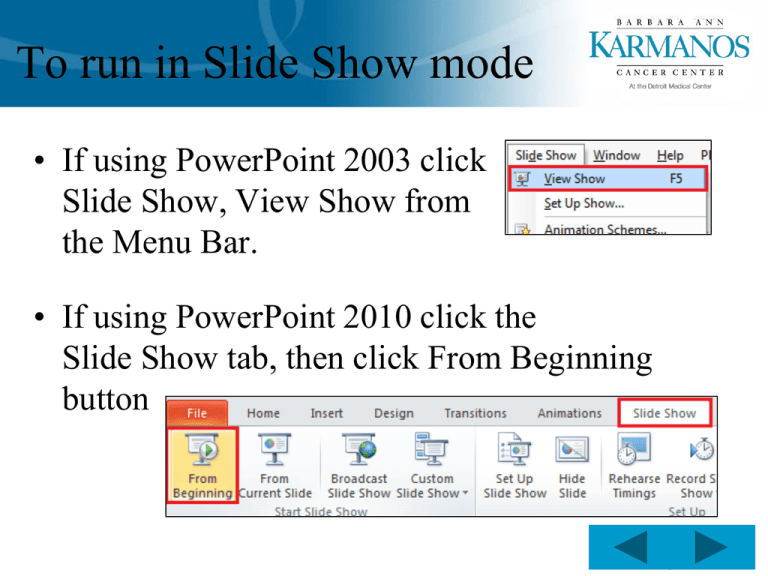
To run in Slide Show mode • If using PowerPoint 2003 click Slide Show, View Show from the Menu Bar. • If using PowerPoint 2010 click the Slide Show tab, then click From Beginning button COMPLIANCE PROGRAM & CODE OF CONDUCT Compliance Begins with you Allison Martin & Kimberly Segal Barbara Ann Karmanos Cancer Center February, 2013 Learning Objectives After completing this training module you should be familiar with: 1. The Karmanos Compliance Program. 2. The Karmanos Code of Conduct. 3. Laws that govern healthcare compliance. 4. How to report suspected non-compliance. Compliance & Ethics • What is compliance? – In it’s simplest form, compliance means following a rule or request. In healthcare, when we talk about compliance, we refer to following the rules, regulations, policies and laws created by the government, insurance programs and payors. • What is ethics? – Ethics simply means doing the right thing. Ethics goes beyond what is allowed by laws and regulations. • What is Karmanos’ philosophy regarding compliance and ethics? – Karmanos will fully comply with all applicable federal and state laws, regulations, standards and other compliance requirements at all levels of government and within the various health professions employed at Karmanos. We will not pursue any business opportunity that requires unethical or illegal activity. Compliance Program The Karmanos Compliance Program A Compliance Program has been established at Karmanos to assist our organization in promoting our commitment to the highest legal and ethical standards. • This program has the commitment of everyone at Karmanos, including the Board of Trustees, senior management, physicians, employees, vendors and others associated with KCC • This program provides education, conducts investigations where there are allegations of misconduct, takes part in monitoring activities, such as audits, to assess areas of risk within the organization. • This program provides a pro-active approach to compliance thereby helping the organization maintain it’s commitment to the highest level of compliance and ethical standards. • Compliance is part of all of our jobs and depends on everyone’s participation for continued success. Elements of KCC’s Compliance Program KCC’s Compliance Program includes the seven elements of an effective compliance program as defined by the US Federal Sentencing Guidelines: 1. Written standards of conduct and policies and procedures that promote the hospital’s commitment to compliance. 2. A Compliance Officer to oversee the program. 3. Compliance education and training for all new hires, with annual training for all staff. 4. Processes to receive anonymous complaints and to allow complaints from staff without any fear of retaliation (for example, the hotline). 5. Responding to allegations of improper activities and, when necessary, developing a corrective action plan. 6. Auditing and monitoring to identify potential areas of risk. 7. Investigation and remediation of identified systemic problems and non-employment or retention of sanctioned individuals. Compliance Policies As required by the Federal Sentencing Guidelines, KCC has policies and procedures in place to ensure compliance with laws and regulations. The source of truth for policies is the KCC Intraweb: http://intrasource.karmanos.org/ Code of Conduct Standards Standard 1 -Quality of Care and Services KCC Commitment To improve the health of the community we serve by providing the highest quality health care services in a caring and efficient manner. 2 -Privacy & Confidentiality To fulfill regulatory standards designed to handle all facets of information management, including reimbursement, coding, security, and patient records. 3 -Coding/Billing Integrity To maintain timely and accurate patient records and billing only for services and Record Keeping actually rendered as documents in patient medical records. Code of Conduct Standards Standard KCC Commitment 4 -Customer Service To apply the Customer Service Standards, which are core to our values, to every interaction with every individual at all times focusing on servicing our patients and families. 5 -Compliance with Laws and Regulations To require all staff members conduct their individual duties and all KCC operations in a manner that meets all applicable legal, ethical and regulatory standards. 6 -Work Place Conduct and Employment Practices To create a work environment in which employees, physicians and others are treated respectfully, fairly and afforded opportunities for professional development. Code of Conduct Standards Standard 7 -Research KCC Commitment To follow ethical standards in any research conducted by physicians and other professional staff. 8 -Conflicts of Interest To regulate our activities to avoid conflicts of interest, actual impropriety and/or an appearance of impropriety. 9 -Protecting Property, To protect both our assets, and those Assets and Information assets of others entrusted to us, against loss, theft, destruction, and misuse. Code of Conduct Policy HR 201 is the Employee Code of Conduct: Ethical Behavior policy Following the Code of Conduct is mandatory for all KCC employees, staff and affiliated persons. While the Code of Conduct provides a basic description of unacceptable conduct or performance it does not cover all behaviors that may occur in the workplace. Failure to comply with the code is a serious matter and can lead to disciplinary action (up to and including termination). Code of Conduct, Decision-Making At times, a difficult situation may present itself and the right decision may not be clear or easy to make. As you consider possible actions to take, ask yourself these questions: 1. Is there a law or regulation that governs the situation? If there is, the law should be followed at all times. 2. Is there an internal policy or procedure that governs the situation? Would my action be consistent with KCC’s commitment to the highest ethical standards? 3. How would my actions be seen by someone outside the organization? 4. Would I feel comfortable explaining my actions to my friends and family? 5. What would the most ethical person I know do? Code of Conduct & Decision-Making Doing the right thing is not always easy. We have all been tempted to take the easy way even if it was not the best way. Try to avoid these excuses for behavior that may not meet the requirements of our Code of Conduct: – – – – – – All the other hospitals are doing it this way. No one will ever know. I don’t have time to do it the right way. I saw my supervisor doing it the other day. That policy wasn’t meant to apply to me. After all I have given this organization, I deserve something in return. Code of Conduct, Decision-Making There are many resources available to help you determine if there is a law, regulation, policy, procedure or standard that would apply to a situation you are faced with: – Your supervisor – Human Resources – Compliance Department – Compliance Hotline Your Responsibility KCC’s commitment to compliance depends upon everyone’s participation for it’s continued success. To fulfill your role, you must commit to the following: 1. Complete all annual compliance training assigned to you and sign a commitment form. 2. Watch for problem areas (areas of non-compliance) while on the job. If you are aware of a violation of the Code of Conduct, it is your OBLIGATION to report it. 3. As a condition of employment, agree to read and abide by the Code of Conduct, and policies and procedures. KCC/KCI Compliance Officer • Compliance Officer is Allison W. Martin, Vice President, Compliance & Regulatory. • Ms. Martin oversees the Compliance Program and is accountable to the Board of Directors. Education and Training Employees are educated and trained to: • Comply with laws, policies and procedures. • Spot potential compliance concerns, such as: - Unethical or illegal behavior - Medically unnecessary services being provided - Unfair or discriminatory treatment of a patient or employee - Billing or coding errors that benefit KCC - Unauthorized use or disclosure of Protected Health Information (PHI) - Misuse of KCC property - Fraud, waste or abuse Conflict of Interest & Anti-Kickback Statute • A potential conflict of interest exists when you or a member of your family works for or has a financial relationship with: – A company that does business with, seeks to do business with or competes with KCC. • See Policy HR 205 Business Conduct and Conflict of Interest • The Anti-Kickback Statute prohibits payment for referrals from physicians. – No employee may take, offer or give anything to or from a physician in exchange for the referral of patients. False Claims Act • In sum, the False Claims Act imposes liability on any person who submits a claim to the federal government that he or she knows (or should know) is false. – An example may be a physician who submits a bill to Medicare for medical services she knows she has not provided. • The False Claims Act also imposes liability on an individual who may knowingly submit a false record in order to obtain payment from the government. – An example of this may include a government contractor who submits records that he knows (or should know) is false and that indicate compliance with certain contractual or regulatory requirements. • The third area of liability includes those instances in which someone may obtain money from the federal government to which he may not be entitled, and then uses false statements or records in order to retain the money. – An example of this so-called “reverse false claim” may include a hospital who obtains interim payments from Medicare throughout the year, and then knowingly files a false cost report at the end of the year in order to avoid making a refund to the Medicare program. There are stiff financial penalties for violations of the False Claims Act. False claims can result in exclusion from Medicare and/or Medicaid Programs. Healthcare Fraud & Abuse Healthcare Fraud: Healthcare Abuse: Generally refers to intentional deception that could knowingly result in benefit to the individual or organization. For example: Practices that lead to unnecessary costs to healthcare payors. This differs from fraud in that there is no evidence that the act was committed intentionally. For example: • • • • • • Billing for services or supplies not actually furnished Signing blank records Falsifying information on records Offering bribes, payment or incentives in exchange for healthcare referrals Misrepresenting services as covered and medically necessary when they are in fact, not. Assigning diagnosis and procedure codes based upon coverage requirements and not based on the actual services performed and actual patient diagnoses. • • • Charging excessively for services or supplies Providing services that do not meet professional standards Billing Medicare as Primary when it is truly Secondary Deficit Reduction Act of 2005 • Applies to Organizations that make or receive $5 million or more in Medicaid payments in a fiscal year • Became effective January 1, 2007 • Applies to employees, medical staff, vendors and contractors • Employees, medical staff, vendors and contractors have the right to report false claims against Medicare and Medicaid and any other health care insurer. Deficit Reduction Act of 2005 • Whistleblower protections will be afforded to those who report or undertake other actions available by law, to expose or assure that KCI’s & KCC’s billing practices are appropriate. • All reporting should be done via “chain of command” – reporting to supervision and – use of the KCC Hotline (888-478-3555). • For further questions, refer to policy ADM 016 and website information for both the Federal and Michigan False Claims Act. KCC Compliance Hotline The KCC Compliance Hotline is available and allows anyone the opportunity to report suspected compliance violations, when normal channels of communication are ineffective. Persons who choose to call the hotline to report their concerns may remain anonymous. KCC Compliance Hotline: 1.888.478.3555 - 7 Days a Week/24 Hours a Day - Untraceable; anonymous Monitoring and Reporting KCC continues to review its business activities ensuring employees are abiding by law and established policies. Examples of ways KCC monitors its activities include: • Performing background checks on new employees. • Auditing departments to ensure they are following established policies and procedures. • Sanction Screening to ensure physicians and staff are eligible to participate in Medicare and Medicaid programs. KCC encourages and expects employees to report any concerns or suspected violations. Monitoring and Reporting Employees should first talk with their supervisor or use their normal chain-of-command when reporting a compliance issue, any observed or suspected HIPAA breach, or concern. NON-RETALIATION No one will be punished or terminated simply for calling the Hotline or reporting a compliance-related problem. You may also call the KCC/KCI Compliance Officer, Allison Martin at 313-576-9084 Investigations • All reported concerns will be reviewed. • A suspected violation brought to the attention of management will be reviewed promptly and reported to appropriate parties, who will assist in resolving the problem. • All reported information will be kept confidential and only shared with those individuals who need to know in order to conduct an investigation, to correct the situation, or as required by law. Penalties If an organization or person is found to be in violation of fraud, waste, and/or abuse laws or other healthcare regulations, the penalties are severe! • Disciplinary action up to and including termination. • Exclusion from participation in Medicare and Medicaid programs. • Fines. • Jail sentences for employees, administrators, and physicians. Additional Training Opportunities For more information, to schedule a live presentation or to discuss any part of Karmanos’ commitment to compliance: Please contact the KCC/KCI Compliance Officer, Allison Martin at 313-576-9084 Summary We hope this Computer Based Learning course has been both informative and helpful. Feel free to review this course until you are confident about your knowledge of the material presented. Click the Take Test button on the left side when you are ready to complete the requirements for this course. Click on the My Records button to return to your CBL Courses to Complete list. Click the Exit button on the left to close the Student Interface.
